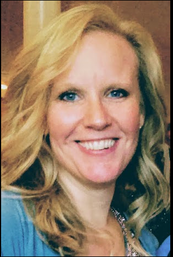BLOG POST BY PTAC MEMBER ANN SCHMIDT I sit here on April 1 and nothing about it feels like an April Fools’ Day. We are now in a shelter in place situation, schools have been closed down for two and half weeks and will remain that way indefinitely. What does indefinitely mean? What does that look like? This is all new territory for all of us. As teachers, we crave that normal routine, the interaction with students, the ebb and flow of the school day. Now we all sit here, in front of our computers trying to deliver instruction, continue and nurture our connections with students and try to process the ever-evolving information about COVID-19. This past Monday, our amazing Digital Film and Video teacher had her students share their films documenting their daily lives during this shelter in place order. While many have been observing this order, our students have been adjusting to this new normal as best as possible. The sobering reality for me, was the students who shared their unique perspective during this time. Many lamented that their senior year was looking like nothing they recognized, others shared they were still reporting to work and even one who shared that their parents were laid off or had hours cut back. Their jobs vary from being food service workers at the retirement center, to the grocery store and other essential services that they are fulfilling. Many were asking for more employment to fill in the lost wages of a parent or guardian. One of my colleagues shared that one student apologized for not completing their work, as they were now working full-time to help supplement the family’s income. As I reflect on these stories, it struck me that while so many remain home, doing what we can, we have students who are experiencing this traumatic time while their normal routine and social structures have been completely disrupted. What will be the emotional toll of this time, how will we as educators and school districts be prepared to address the needs of our students when social distancing is the new norm? Now more than ever, we need to put compassion first, strive to help students learn to grow and develop resiliency through this challenging time. Grades and content should be a far second during this national crisis we are all experiencing. Please don’t discount the perspective of our students and the lens from which they see all this unfolding. It is critical to keep this student perspective in the forefront of our planning as we move forward, not just now, but when that day comes and we eventually return to the brick and mortar school.
0 Comments
BLOG POST BY PTAC MEMBER HOLLIE WOODARD Hollie Woodard’s piece is cross-posted from her personal blog, The Red Flag Parent. From this point forward the word CAN’T can no longer be used in education. For those of us on the educational advocacy front line, the word CAN’T has proven to be our biggest adversary. In 6 short, yet seemingly long, instructional days, the word CAN’T has been pushed aside by the biggest educational decision-makers in the country and WE MUST has been replaced pushing all educators and educational decision-makers into uncertain and new areas of innovation. Don’t get me wrong, I’m not in any way downplaying the serious immediate and long-term health and economic issues associated with this virus, but as I sit at home contemplating an array of emotions regarding the field that I am most passionate, I can’t help but feel hope. I’m a relentless educational advocate. I work hard to shine a light on the ways we are getting education wrong in PA. This is why if you are one of my colleagues or friends, you have also spent part or even most of our relationship mad or annoyed at me because I have unapologetically pushed you out of your comfort zone by identifying how you contribute to the problem. The focus of my advocacy has been special education, digital equity, and 21st Century teaching practices. As the mother of a child with special needs, I have first-hand experience with the problems in special education, specifically in the way in which dyslexia is handled...or often not handled...by public education. I serve on the ACT Leadership Committee of Decoding Dyslexia PA and work with a group of amazing dedicated parents and grandparents of special education students who share my same experience. We work to use our collective voices and skills to try to change special education in PA. In addition, I currently serve as the Advocacy Chair of PAECT (Pennsylvania Association for Educational Communications and Technology) which is a team of dedicated Pennsylvania educators and administrators who work tirelessly to support educators in their quest for 21st century best practices. Because of the diverse economic and geographic demographics of students in PA, digital equity is an issue that PAECT passionately advocates for, and as the Advocacy Chair, I have taken the lead in the equity battle. Finally, I’m entering my third year as a KTI (Keystone Technology Innovators) Lead Learner. KTI Lead Learners are a squad of award-winning innovative educators in the state of PA who volunteer to work all year long and give up most of their summer vacation to prep and provide a week-long professional development with a focus on 21st Century Educational Best Practices for selected teachers in the Commonwealth. I and my like-minded advocacy warriors have long battled in the educational arena, armed with tiny battery operated LED flashlights, tirelessly fighting to shine a light on these educational challenges. However, in one giant burst of lightning, COVID-19 has forced educational decision-makers into that same arena requiring them to not only talk about issues in Special Education, digital equity, and 21st Century teaching practices but to solve them as well. My advice to those leaders who now find themselves in this new scary world of uncertainty, where decisions are no longer dictated by the proverbial WE CAN’T, is to tell them that they are not alone in this battle. Turn to those who have been screaming, yelling, whispering, posting, tweeting, and arguing WE MUST and ask them to collaborate. You know who we are...and we’re ready to help. COVID-19 will no doubt serve as a notable marker in our human timeline in which we talk about what life was like before the virus and then after the virus. While it will challenge and stretch the resiliency and survival skills of mankind, it already has done the same for education. The innovation we generate to provide FAPE, digital equity, and virtual learning will no doubt generate much needed educational change, but most importantly what COVID-19 is doing and why I believe it is the Educational Advocate of the Century, is that it is showing us that WE CAN. |
AuthorPennsylvania Teachers Advisory Committee Archives
March 2022
Categories |

 RSS Feed
RSS Feed